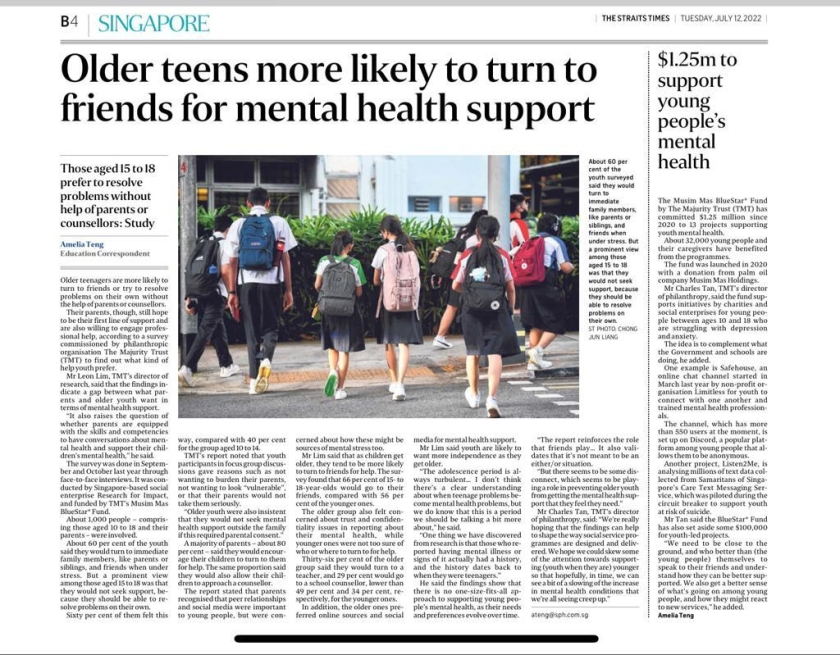Mental health conditions have been called the ‘second pandemic’ with rates of depression and anxiety having grown 28% and 26% respectively. The burden of COVID-19 and its attendant mental health challenges is also most acutely felt by those who are already vulnerable.
Youth mental health is a particular concern in Singapore, with challenges emerging even before the pandemic. While lifetime and 12-month mental health issues worsened across almost all groups in Singapore between the 2010 and 2016 Singapore Mental Health Studies[1], mental health for young people was a particular concern: young people reported the highest prevalence of 12-month and lifetime mental health disorders in both 2010 and 2016, and they also recorded the highest increase in prevalence among all groups. Put another way: young people’s mental health was already the worst among age groups in Singapore in 2010 and worsened more precipitously than that of any other age group in the period 2010-16.
Figures are not tracked in the mental health study for those under 18, but news reports indicate growing concern about mental health for this group, and many mental health conditions are known to emerge in childhood. In a 2005 US study of more than 9,000 participants, it was found that 75% of mental health problems are established by age 24, with 50% established by age 14[2]. In 2022, a national study reported that about 1 in 3 youth in Singapore had reported internalising mental health symptoms such as sadness, anxiety, and loneliness[3].
The COVID-19 pandemic has also had particularly negative effects on young people. Research from Singapore’s Institute for Policy Studies released in April 2021 revealed that more than 30% of respondents aged 21 to 29 were “rather worried” or “very worried” about “losing their purpose for living”, versus just 11% of over-60s[4]. A 2020 poll by the National Youth Council found that nearly half of respondents aged 16-34 felt their mental health worsened during the pandemic[5]. REACH, the IMH’s Response, Early Intervention and Assessment in Community Mental Health team, experienced an increase in consultations and referrals resulting in increases in wait times of 1.5-2x[6].
Young people’s mental health may be disproportionately affected by the COVID-19 pandemic because of increased time learning from home; hindered ability to sustain peer relationships due to home based learning and regulations on social gatherings; challenges transitioning into the workforce or pursuing their early careers at a time of uncertainty and widespread retrenchment; increased use of screens and social media; challenges transitioning into secondary or post-secondary education against this same backdrop; and/or delays and challenges in key early life transitions, among other factors
To contribute to a better understanding of the ways communities can better support our young people, CEI worked alongside our partners at Research for Impact and Blackbox on a project commissioned by Majurity Trust to better understand the attitudes of both youths and parents towards mental health support. This study is the first to compare perspectives of both parents and youths toward mental health support and services in Singapore. The study found that young people are would most frequently choose to turn to their friends and family for support when they experience stress. Parents also expressed a similar intention that they would like their youth to turn to them for mental health support, but expressed concern about the emotional maturity of peers to support youth.
Overall awareness of the importance of mental health among youth was generally high, but younger youth (aged 10-14) and older youth (15-18 year olds) described different barriers to seeking mental health support. Younger youth were more unsure of who or where to turn to for help and support, older youth were more aware of external mental health support available to them but were more concerned about being able to trust service providers, and the confidentiality these services could provide. Older youth also expressed an inclination to manage mental health issues on their own, citing reasons such as not wanting to look ‘vulnerable’, or that their parents would not take them seriously.
Following on the findings of this study, the authors recommend:
- Investing in capacity building for parents to provide appropriate mental health support
- Building confidence and competencies among youths to support their peers
- Having more dialogue about the concerns around confidentiality of mental health support services
- Campaigns be more targeted to address the specific concerns of parent, older youths, and younger youths.
This study will be published soon and findings have been shared in the Straits Times.

- Subramaniam, M., Abdin, E., Vaingankar, J. A., Shafie, S., Chua, H. C., Tan, W. M., ... Chong, S. A. (2019). Minding the treatment gap: results of the Singapore Mental Health Study. Social Psychiatry and Psychiatric Epidemiology, 55(11), 1415–1424. https://doi.org/10.1007/s00127-019-01748-0
- Straits Times, 2022.
- Mental Health Foundation. (2015). Fundamental Facts About Mental Health https://www.mentalhealth.org.uk/sites/default/files/fundamental-facts-15.pdf
- Mathews, M., Suhaini, S., Hou, M., & Tan, A. (2021, April). THE COVID-19 PANDEMIC IN SINGAPORE, ONE YEAR ON: POPULATION ATTITUDES AND SENTIMENTS. IPS Working Papers.
- Lau, J. (2020, July 18). $1m fund launched to help young people facing mental health issues. The Straits Times.
- Renjan, V., & S.S. Fung, D. (2020). Debate: COVID‐19 to the under 19 – a Singapore school mental health response. Child and Adolescent Mental Health, 25(4), 260–262. https://doi.org/10.1111/camh.12426
